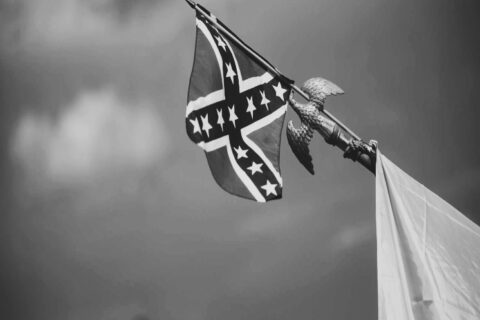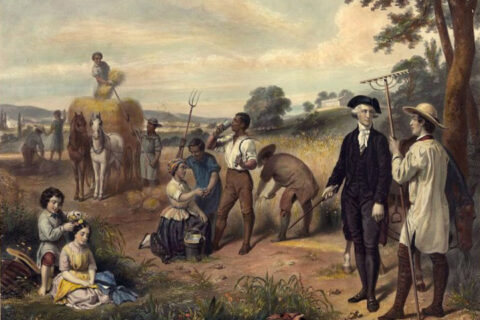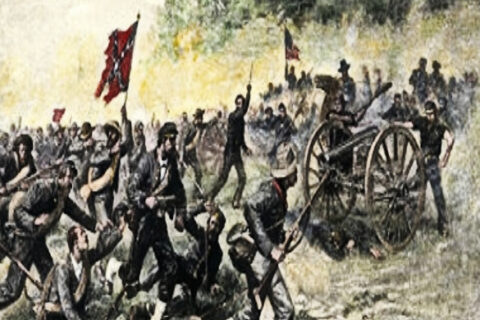For 14 consecutive years leading up to 2019, this article informs us, Columbia, South Carolina has commemorated the occasion of the city’s “longest day” – Feb. 16, 1865 – with a re-enactment of the scene on the anniversary of that fateful day 158 years ago. As the article points out and history affirms, this was the day General Sherman’s army began its pre-invasion bombardment of Columbia from its position at Lexington Heights on the other side of the Congaree River.
As a non-citizen/non-resident of Columbia, it is of course not for me to say what day of the year Columbians choose to commemorate as the city’s longest day, nor of how they choose to commemorate the day, for that matter. Indeed, to do so would be the height of presumptuousness on my part. I would, nevertheless, and at the risk of upsetting the good citizens of Columbia who might one day read this article, respectfully make the argument that perhaps the planners and organizers of the annual event originally undershot the mark by a day. The reasons for which assertion the remainder of this little write-up will, I hope, serve to explain well enough.
What initially led me to the 2019 article linked above was simply that I had, only days before the article’s publication, finished reading the published “civil war” diary of Columbia resident, Emma LeConte. In which pages young Miss LeConte describes the uncertainty and anticipation of the days leading up to the bombardment of the fair city, as well as the days immediately following. With this information and Miss LeConte’s first hand perspective in mind, it was, and is, slightly difficult for me to believe that Feb. 16, 1865, can in fact be described as “Columbia’s Longest Day” in strictness.
Certainly the 16th was a long day, and a very long day indeed, which Miss LeConte’s lengthy diary entry for the day fully attests. I won’t quote directly from the diary entries in this article because 1) they are rather lengthy, and 2), to get a real sense of the terror General Sherman unleashed on Columbia’s helpless non-combatants, you should read the entries in entirety, within the broader context of the whole diary. Notwithstanding those two issues preventing my posting snippets from the diary more or less out of their broader context, there are a couple of remarkable things recorded in the entries for those days that I will paraphrase for your consideration. I encourage you to fact check my accounting within the pages of the diary itself.
On Feb. 16, 1865, Miss Emma LeConte and her mother, along with a few close friends and relatives, were hold-up in the LeConte house on the outskirts of Columbia. The party of course knew that Sherman’s army of blue devils (as Miss LeConte would eventually come to describe the Yankee invaders of her fair city) had positioned itself just on the other side of the river, and were fully expecting it to invade the town at any moment. At one point in their speculations concerning the matter, one of the group expressed a concern that Sherman might order the bombardment of the city prior to invading, and without the benefit of ‘fair warning’ given the city’s authorities or its residents by extension. Mrs. LeConte (Emma’s mother) quickly answered the concern by re-assuring the group that Sherman would not do such a thing since he had not, as yet, given the city an ultimatum to ‘surrender or else.’ No sooner had the words left her mother’s lips, Emma informs us, that the dreaded and piercing sound of a shell passing overhead engulfed the house, shortly to be followed by its destructive explosion nearby. Thus began the shelling of Columbia, which lasted the rest of the day, save a couple hour interval.
One important thing in this relation the reader begins to understand is that the well-to-do women of Columbia had mistakenly believed that General Sherman was a gentleman, and a man of honor. This is perfectly understandable in hindsight, when we consider the LeContes’ rank and station in the society of Columbia, South Carolina, and the broader society of the Old South; until they experienced it first hand, it was simply unfathomable to them that a man of General Sherman’s low character could ever rise to the rank of General, even in the Yankee army.
In any event, Miss LeConte’s entries for the 17th & 18th bear out that Columbia’s “longest day” was in fact the 17th of February, not the 16th. At least to the minds of Miss LeConte and the motley crew of loyal rebels hold-up in the LeConte residence. The Yankees invaded Columbia on that day, and none of her residents knew quite what to expect at the outset of the invasion. Many expressed fears that he would burn the town, but General Sherman quickly assured the authorities that he had no intention of wantonly destroying private homes and private property by any means, incendiary or otherwise.
Miss LeConte later records in her diary entry for the day how unbelievably stupid and, in her words, “idiotic” it was of their company to actually believe the word of a Yankee, and of the likes of General Sherman at that. No sooner had Sherman given his ‘solemn’ promise to spare private property than the great conflagration began. Miss LeConte and her company were eyewitnesses of the terrifying events unfolding around them on every side. They watched with their own eyes as the drunken Yankee soldiers, armed with musket and incendiaries alike, entered private houses all around them with the singular purpose of setting them all ablaze.
Luckily (or Providentially) for Miss LeConte and her family, Sherman’s arsonists never got around to torching their house. Miss LeConte speculates as to one possible (even probable) reason the house was spared when others weren’t. Which I leave to you to read for yourselves. But another possibility she touches upon is that perhaps the soldiers, like the LeConte’s, believed it unnecessary in any case, since the embers from burning structures all about the LeConte house were falling onto its roof in great torrents like heavy rain.
Virtually every structure around them was burned to the ground. Indeed, as helpless women and children would flee their burning homes, bearing arms-loads of every possession they could carry out necessary for their protection from the elements in the days and weeks to come, the soldiers would violently wrench the possessions from their arms, throw it all onto a single pile in their yards, and set the pile ablaze as well. The scene, as Miss LeConte describes it, is enough to make a decent man’s blood boil with righteous indignation!
Given the foregoing information and more, I respectfully submit that Feb. 17th, 1865, was, not only the most terrifying day Columbia had, and has ever seen, but indeed was, and remains, her “longest day.” But in the interest of full disclosure it really doesn’t concern me at all on what particular day the good people of Columbia choose to commemorate the city’s “longest day;” I merely used the question of dates as a pretext for writing this article, and for turning those of you heretofore unaware of its existence onto Emma LeConte’s interesting and highly informative memoirs. And, I, of course, am very glad Columbians memorialize the event, regardless of what calendar date they choose to do so.
Today, I raise my glass to you, Columbia! Never forget!
You permitted, if you have not ordered, the commission of these offences against humanity and the rules of war. You fired into the city of Columbia without a word of warning. After its surrender by the Mayor, who demanded protection to private property, you laid the whole city in ashes, leaving amid its ruins thousands of old men and helpless women and children, who are likely to perish of starvation and exposure. Your line of march can be traced by the lurid light of burning houses, and in more than one household there is an agony far more bitter than death.
The Indian scalped his victim, regardless of age or sex, but with all his barbarity, he always respected the person of his female captives. Your soldiers, more savage than the Indian, insult those whose natural protectors are absent.
General Hampton to General Sherman, Feb. 21, 1865







My God, none of this is taught to our children, or anyone’s for that matter. Now we are overrun with Yankees. When are we going to organize? I mean we know not to let boomers speak or have opinions now, so we should be good to go as far as getting our act together. We have to unite as a people, we can no longer act as independent states until they are all driven out. Nobody but us should have a voice in any of our discussions or decisions, especially when it comes to our history, which is a large part of our identity. We need activist groups and revenue streams, we need everything, an entire parallel society and government that can take the place of the Yankee occupational one that we are under now.
We. Must. Organize.
“Americanism” at its. “finest”. To be repeated over and over at places like Dresden, ad nausem.
I’ve written before of the close similarities in the way the “allies” conducted the 2nd WW, and the way the Yankees conduced the WBTS; of the infliction of “Total War” on non-combatants in both cases, which of course included, but was not limited to in either case, a naval blockade resulting in the systematic and purposeful starvation of the non-combatant native population, deprivation of essential medicines and so on; the publication of photographs of emaciated prisoners of war, with of course the (false) accusation attending them that the “enemy” were purposefully starving their prisoners of war, as well as poisoning them with malice aforethought and purely out of vengeance; the dissemination of photos of “Whipped Peter,” showing the ‘horrors’ of antebellum slavery – a man, by the way, who, if he lived in our day, would very likely be on ‘death row’ in one of our vaunted “Super-Max” prisons, where he’d be slinging his own urine and feces and other bodily fluids on his guards anytime any one of them got within throwing distance of his cell; of the kangaroo court “military tribunals” that followed in both cases, and so on and so forth. I’ve also written before of the scene towards the end of the movie “Patton” wherein General Patton pronounces that, given the OK from Ike, he would invade Russia and “murder those commie sons a bitches, and make it look like they started it.” Reckon where General Patton got the idea to murder people while making it appear as though they were the ones that started it to begin with? Hmmm.
Those people are not Americans, they are Yankees, a distinction that few in the world understand despite that ignorance costing you so very much, including Dresden.
This is why they need their own government(s) in the Northern states. They need to be separated from the South and the West.
Tsk Tsk Michael – temper my lad, temper.
The City of Columbia, knows (or will acknowledge) little or nothing about Sherman’s invasion or even the war. According to the history page on their web page, nothing worth mentioning happened between 1853 and 1870. Don’t believe me? Check it:
https://www.columbiasc.net/about-columbia
There’s only been a marker to commentate the event since 2015 (sesquicentennial of the event) and it’s pc nonsense. “Longest days” consist of Yanks on one side of the Congaree river (West) and some Rebs firing back from the other side (East). Years ago it had a program of sorts, book signings, and reenactors, but since the summer of 2015, when they took down the CBF from the SC Statehouse grounds, remembering any confederate is strictly taboo!
—A Native of Columbia, SC
Hello, Pauly G.
Thanks for the first hand perspective and insights. For the record, I for one do not doubt the veracity of a single word you wrote. Indeed, all of it is what one has come to expect in this day and age, when it has become “in vogue” to dishonor our fathers and mothers (in direct violation of the biblical command to honor them, although they be poor), in a thinly veiled act of (reconstructed) virtue signaling. Very sad on the one hand, and infuriating on the other. Thanks also for providing us with the link to Columbia’s history page – I’ll check it out, as it might be that it will provide me more fodder for a future related article.